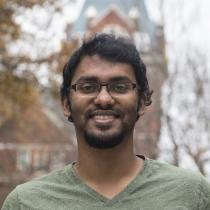
Roshan Selvaratnam
What is your next adventure?
My parents are coming in from Malaysia for the ceremony, so, immediately after I walk, I will go with my fiancee and my parents to California for a vacation. When I return, I have a temporary job at the Office of Undergraduate Admissions, and I'll use the time to start applying for jobs in my field. Tech is one of my passions, and I have excelled at presentations, so I've had a great experience working with Admissions. As far as what I want to do with my degree, I'm a 'big picture' guy, so I'll be looking for work in systems engineering in the space industry. A Ph.D. is in the back of my mind, too, so, wherever I work, I will look into going back when the time is right.
What about your next adventure are you most looking forward to?
I'm definitely excited about getting out of school. After graduate school, I don't think I'll be as stressed in the real world. I've learned to take on a large workload and see things through. But, at a job, you get to go home at the end of the day. In graduate school, there is never a break.
Did you have any previous co-op, internship, or research experience in this area?
Research played a big part of my time at Tech. As an undergraduate, I worked with [Professor] Mello, testing material integrity using cameras to measure displacement and strain in objects. Then I worked on trajectory simulation with [research engineer] Stephen Rodgers at ASDL. In grad school, I worked with [Professor] Glenn Lightsey on Cupid's Arrow, a NASA-funded project that's about to wrap up. I did trajectory analysis and a simulation of the thermo environment. The idea was to figure out how sturdy the heat shields will need to be when Cupid's Arrow [a cubesat] goes to Venus. Hopefully, additional money will come into this project, so we can do more. It is much bigger than just Georgia Tech - it is headed up by JPL. And being a part of it will give Tech a place in a very important planetary mission.
How did your educational experience at GT-AE help you achieve that goal?
The curriculum at Tech emphasizes critical thinking and problem solving, which is great training for the work world. It teaches you to be dedicated and to be consistent in how you approach learning. After awhile, if you stick around, you see that If you put your mind to it, and put in the effort, you can do it. That rigor has shaped me in so many ways. If I get an assignment that is due in two days, I know how to attack it so that I turn something worthwhile in on time.
What advice would you give to an underclassman who would like to follow the same path?
Work hard, and ask for help. When I first came to Tech as an undergraduate, it was the first time in the U.S. and my first time in a school that had so many people. I'm not especially proud of my first semester, but Tech taught me to get on the bus early and stay there: if you slack off, that bus will leave you miles behind everyone else. There's plenty of help around campus, but you have to learn to ask for it.
Another thing I'd share is this: Tech has a steep learning curve. It's harder in the beginning than the end. That's true with individual courses and it's true over time. Most classes, you'll learn the really tough stuff right up front and then you'll spend the rest of the semester applying it. In general, I felt more in my element as a junior and senior and in grad school than I did my first two years. I knew more.
The last thing is this: If you fail a class or don't do well, it's not the end of the world. There are opportunities to bounce back, so pick yourself up and keep going. It's not the number of times you fail, but how well you bounce back that matters.